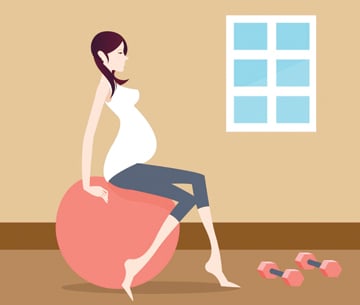Pregnancy is undoubtedly a bright new chapter in a woman’s life; however back pain is something that every expectant woman experiences. You! takes a look...
health
Pregnancy is undoubtedly a bright new chapter in a woman’s life; however back pain is something that every expectant woman experiences. You! takes a look...
Ask any pregnant woman and she will surely agree that back pain during pregnancy is one of the most uncomfortable feelings one can have. The pain is related to a number of factors such as gaining weight. It is due to weight gain that the body’s centre of gravity changes and hormones relax the ligaments in the joints of your abdomen. This week, You! takes a look at the causes of backache during pregnancy. There are several ways of reducing the pain - making your pregnancy smooth. Read on to find out...
Causes
Basically what happens is that during pregnancy hormones are released that allow ligaments in the pelvic area to soften and the joints to become loose in order to prepare the body for giving birth. This shift in joints and loosening of ligaments may affect the support your back normally gains. Also, your centre of gravity will gradually move forward as your uterus and baby grows, causing your posture to change. Additional weight is another cause of backache. If you are already suffering from back pain, poor posture, excessive standing, and bending over can trigger or escalate the pain if you have it. And most importantly, stress usually accumulates in weak areas in the body, and because of the changes in your pelvic area, you may experience an increase in back pain during stressful periods of your pregnancy.
Ways of prevention
Back pain may not be prevented completely, but there are things that you can do to reduce the severity or frequency of it. Consider these ways to give pregnancy back pain the boot.
Practice good posture: To avoid falling forward (due to the change in centre of gravity), you might compensate by leaning back - which can strain the muscles in your lower back and contribute to back pain during pregnancy. Keep these principles of good posture in mind:
Stand up straight and tall: Try to stand straight and take care of your body moves. There should be no bending or curling up to a certain position.
Keep it straight: To ignore backache, try to hold your chest high. It will help you in maintaining a good posture.
Keep it relaxed: Keep your shoulders back and relaxed in order to stay away from back pain. Choose a chair that supports your back, or place a small pillow behind your lower back.
Don’t lock your knees: Make sure not to sit with cross legs. It affects your posture and becomes a cause of backache. Also, when you stand, use a comfortably wide stance for the best support. If you must stand for long periods of time, rest one foot on a low step stool - and take time for frequent breaks.
Get the right gear: Wear low-heeled - not flat - shoes with good arch support. Avoid high heels, which can further shift your balance forward and cause you to fall. You might also consider wearing a maternity support belt. Although research on the effectiveness of maternity support belts is limited, some women find the additional support helpful.
Lift properly: When lifting a small object, squat down and lift with your legs. Don’t bend at the waist or lift with your back. It’s also important to know your limits. Ask for help if you need it.
Sleep on your side: Sleep on your side, not your back. Keep one or both knees bent. Consider using pregnancy or support pillows between your bent knees, under your abdomen and behind your back.
Try heat, cold pads or massage: Massaging your back with a heating pad or ice pack might also help.
Physical activity: Regular physical activity can keep your back strong and might relieve back pain during pregnancy. Try low intensity gentle activities - such as walking or water exercise. You might also stretch your lower back. Rest on your hands and knees with your head in line with your back. Pull in your stomach, rounding your back slightly. Hold for several seconds, and then relax your stomach and back - while keeping it flat as possible. Gradually work up to 10 rounds. Ask your health care provider about other stretching exercises, too.
When to consult your gynaecologist
If you have severe back pain during pregnancy or back pain that lasts more than two weeks, talk to your health care provider. He or she might recommend medication or other treatments.
Keep in mind that back pain might also be a sign of preterm labour or a urinary tract infection. If you have backaches is accompanied by vaginal bleeding, fever or burning during urination, contact your health care provider right away.